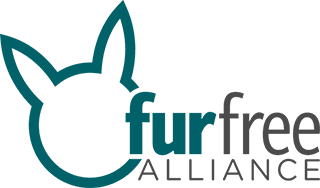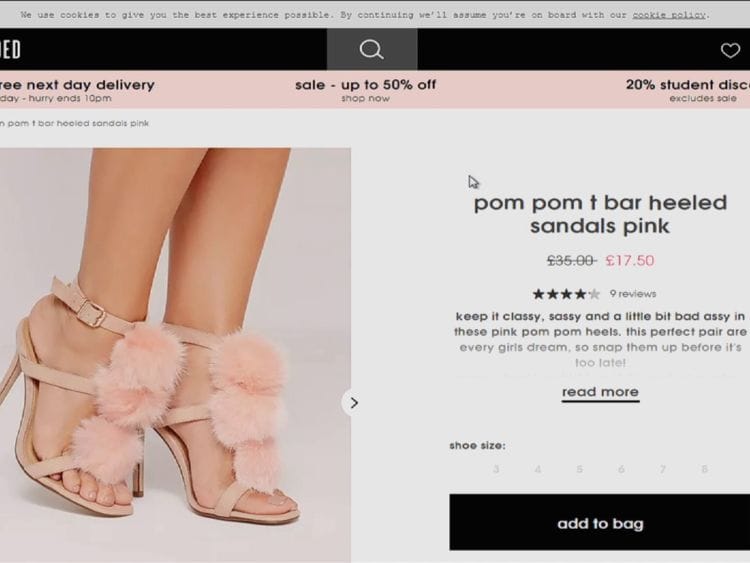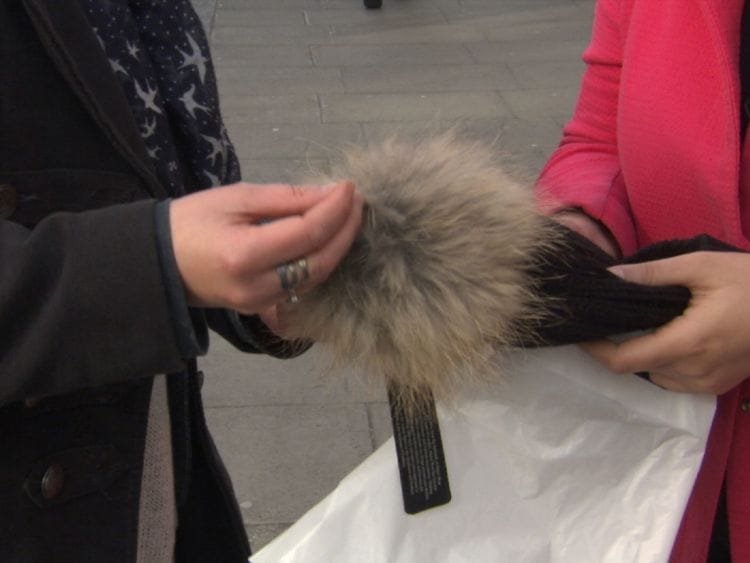
Illegal cat fur sold as faux fur on British high-street
10 APRIL 2017, LONDON—An investigation by Fur Free Alliance member Humane Society International/UK has discovered shoes containing real cat fur for sale on the British high-street by youth fashion chain Missguided.
The import and sale of fur from domestic cats and dogs has been banned across the EU since 2009, and Missguided is a vocal advocate of its fur-free policy. Despite this, laboratory tests confirmed that the pom-poms of fur decorating the shoe were cat fur [1]. The shoes, which have been on sale by the retailer both online and at its Westfield Stratford store, list only man-made materials on the label.
Concerned shopper Donna Allison alerted HSI/UK to the shoes after suspecting they contained real animal fur, despite receiving an assurance from the store’s official Twitter account of their policy to only sell fake fur. In countries such as China – where the Missguided shoes were made – an estimated two million cats a year, including pet cats, are snatched from the streets and killed for their meat and fur.
HSI has contacted Missguided about the finding and has forwarded the information to Trading Standards and asked that the enforcement authority investigates the findings further in relation to the The Cat and Dog Fur (Control of Import, Export and Placing on the Market) Regulations 2008. Donna Allison said:
“I find it horrifying that Missguided and other retailers are selling real fur — in my case cat fur — and that they didn’t appear to take action when I raised my concerns about this serious issue. All retailers should be taking action to ensure complete traceability of their materials. It’s unacceptable that they are helping fund an industry where animals have to endure unimaginable cruelty and for something so unnecessary. I urge everyone to be more vigilant and understand how to identify and ensure they’re buying faux fur.”
Whilst trade in dog, cat and also seal fur is banned across the EU, and all fur farming has been illegal on moral grounds in the UK since 2003, imports of fur from a range of species such as fox, rabbit, mink, coyote, racoon dog and chinchilla can still be legally sold here. It’s a double standard that makes no moral sense, and yet as a member of the EU single market, unilaterally banning the trade of fur into the UK would likely have been challenged in Brussels and by EU member nations that continue to farm animals for their fur.
However, Brexit offers the opportunity to change that, and HSI/UK is calling on the British government to make the United Kingdom a fur-free zone by extending the cat, dog and seal fur bans to all fur-bearing species. A 2016 YouGov opinion poll [2] asked whether people found it acceptable or unacceptable to buy and sell fur from nine different species and found that, averaged across all species, only one in ten people believe it is acceptable to buy and sell real fur. Claire Bass, executive director of HSI/UK, said:
“It is extremely concerning to find cat fur on sale illegally in the UK, both because of the cruelty that cat and all fur products represent, but also because it will rightly dent the confidence of consumers seeking to buy only fake fur. Fake faux fur is a growing problem; when items have cheap price tags and labels saying ‘100% acrylic’, consumers can understandably be caught out mistaking them for fake fur, when in fact they contain fur from a tormented animal. Independent stores, popular markets like Camden, as well as online retailers such as Amazon are awash with cheap animal fur-trimmed garments that are either mislabelled as ‘faux’ or not labelled at all. To properly protect both animals and consumers the government needs to take action to stop Britain’s insidious fur trade.”
The Missguided ‘fake faux’ fur shoes are the latest in a large number of similar items exposed by HSI/UK over the past couple of years, including several well-known high-street brands. Most recent items discovered by HSI’s secret shoppers from December 2016 – February 2017 include:
* another shoe style at Missguided that tested positive for rabbit fur;
* a pair of gloves at ‘fur free’ retailer House of Fraser that tested positive for rabbit fur;
* a range of shoes from Westfield Stratford store Primars all sold as fake fur but found in tests to contain fur from rabbit, mink and fox;
* a bobble hat sold on Amazon UK as faux fur but testing positive for raccoon dog or fox fur (this listing included an on-screen no-fur assurance); and
* another bobble hat sold on popular fashion boutique website Lily Lulu sold as “faux fur” online, labelled as 10% marmot on delivery but testing positive for raccoon dog fur when sent to the lab
In several cases where HSI’s secret shopper questioned staff in-store, they incorrectly confirmed items were faux fur. HSI/UK believes that most consumers would be horrified to discover they’ve inadvertently bought real fur. HSI’s Claire Bass said:
“We know that the vast majority of British people reject the inherent cruelty of the fur trade but at the moment they are not getting the right information as consumers to avoid it. Clear labelling of all fur is an obvious starting point that will likely reduce the UK’s fur trade significantly, but we don’t believe that goes far enough. Whether it’s fur from coyotes caught in the wild in agonising traps, raccoon dogs and foxes enduring miserable lives and painful deaths by electrocution on fur farms, or cats bludgeoned to death in China, we believe all fur is cruel and should be banned regardless of species. Morally, there is no logic to banning fur from some animals and not others, and Brexit means we could have the opportunity to reflect public opinion and make the UK the world’s first fur-free nation.”
Around the world in countries such as China, France and Poland, animals on fur farms can be subjected to the same terrible conditions as those the UK banned back in 2000, with the UK’s final fur farm closing in 2003. Beautiful wild animals are kept their entire lives in filthy, tiny cages, forced to endure physically and mentally damaging conditions before being killed and skinned for their fur. Wild animals such as coyotes fair no better, caught in agonising traps for hours or even days before they’re put out of their misery.





